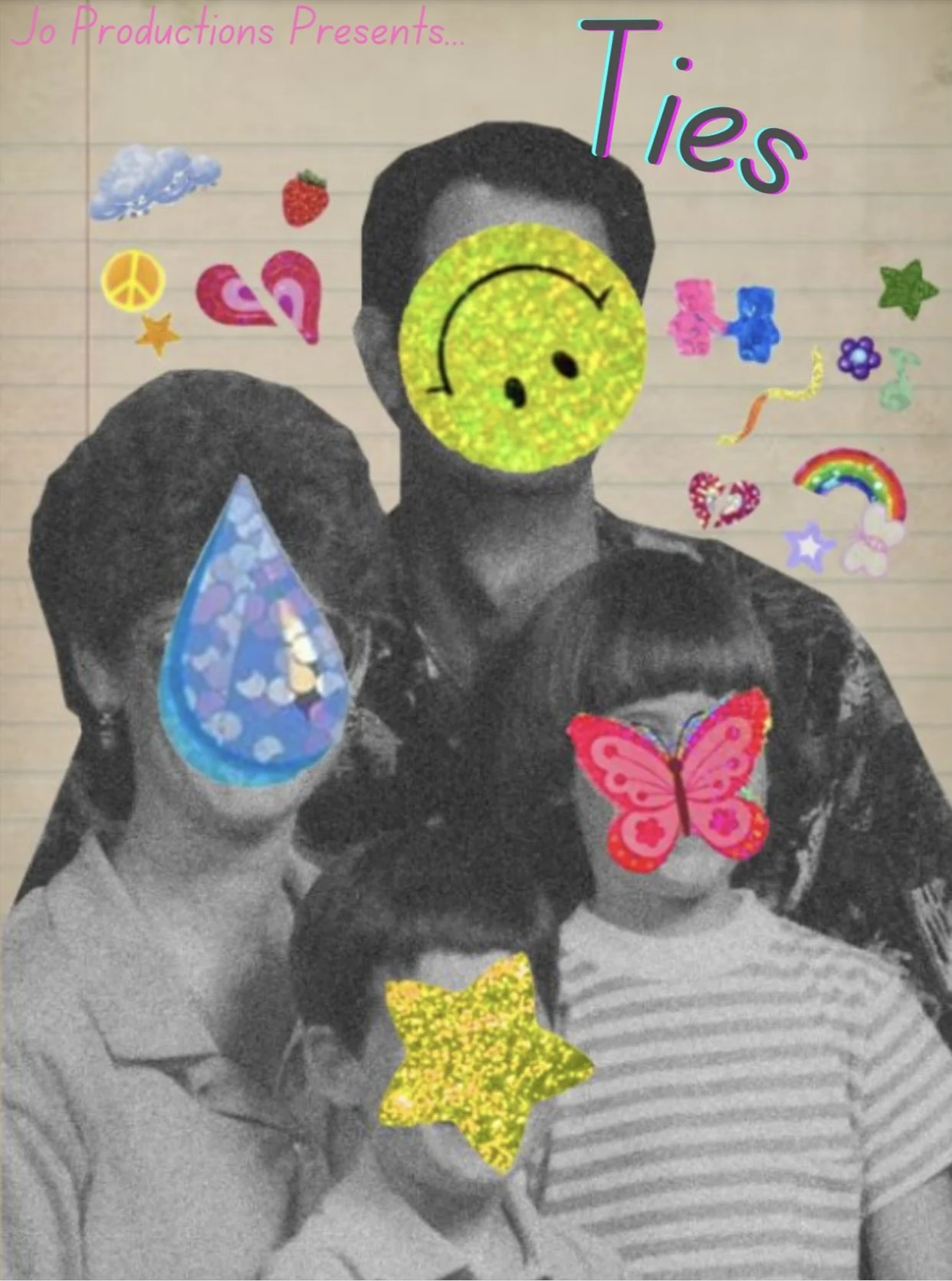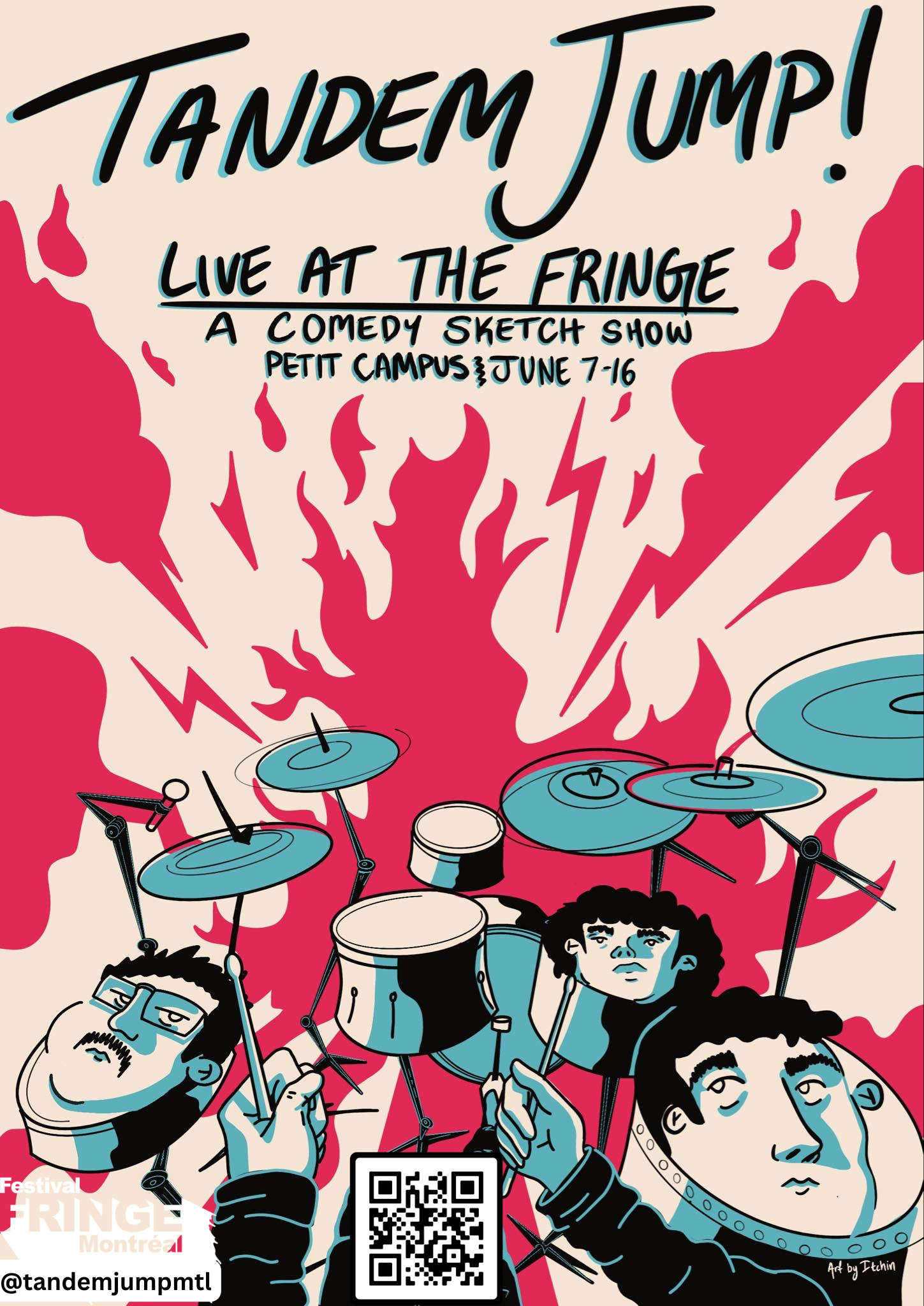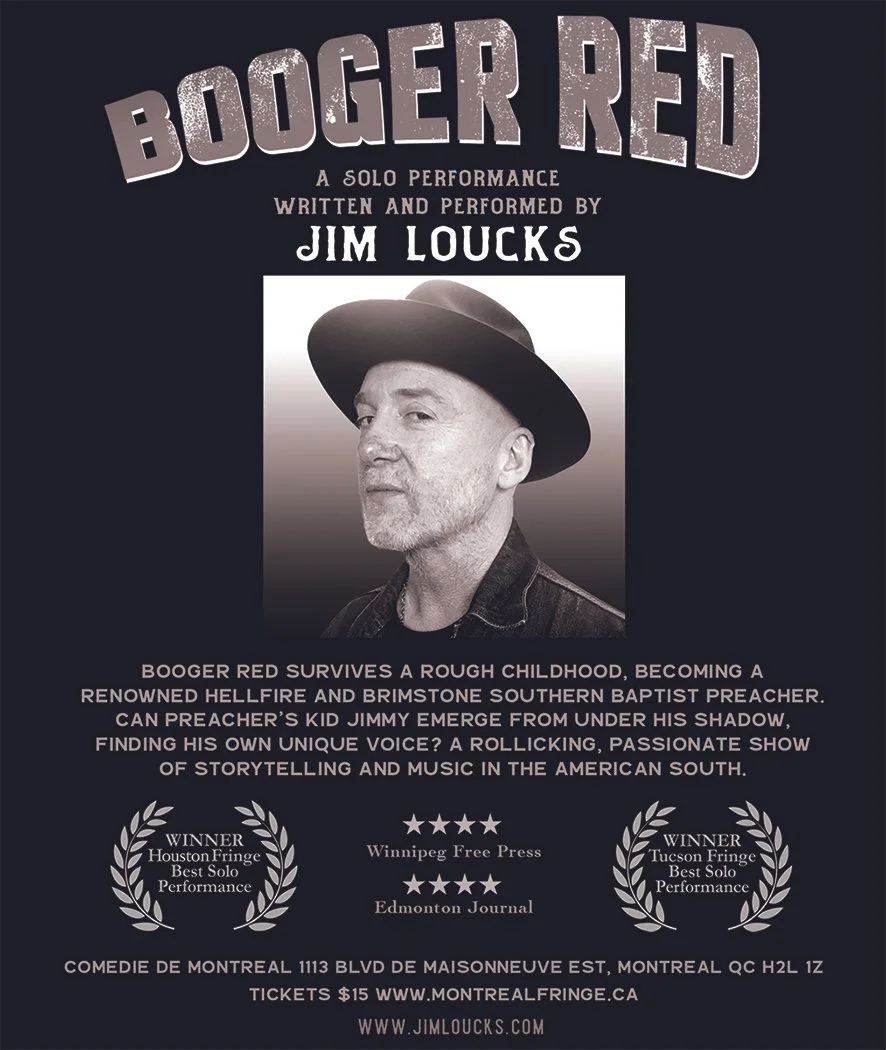Scotty’s Reviews
Attached
Kerrin-Lee Whyte’s Attached, presented by Bioluminescence Productions, is a character study which looks at human connection through the lens of a seemingly upbeat university student and her social circle. It examines the dynamics of her engagement with significant people in her life: her best friend, her boyfriend, a new friend with a professional path that is parallel to hers, but most importantly, the person in her life with whom she is indelibly bound.
Having only been in Montreal for a few months shy of two years, I have found that walking through its streets while raining in the summer to be magical. However, walking through the streets of Montreal during a torrential downpour is not. I scurry to the side door of Mission Santa Cruz to the entrance of the performance space, shake off the water and wish I had spent a little more money on an umbrella as I notice I am thoroughly soaked.
After descending down a flight of stairs, we enter a large open space hosting an unlavish backdrop. During the play the set is just a few movable chairs, a blanket, and some seat cushions which is fitting, since the production’s focus is on a specific perspective on the roots of expressed behavior. The setup harkens back to Grotowski’s Poor Theater with the bulk of the process going into the acting, the story, and the heart. It is a Fringe Festival after all.
Director Casie Marie Ecker has an intriguing ability to craft frequent moments that are surprising and inevitable at the same time. For Attached, she cultivates an event that seems to test an audience’s ability to accept a “genre medley.” Ecker fully constructs and appends heartbreaking drama, psychological mystery, broad comedy, ritual, metatheatre, and a bunch of other incongruous stuff all “baked into a beautiful pie.” It’s there in the text and, sure, it’s been done before, but Ecker’s instinctive execution sets it apart from what this reviewer has previously seen. Her work on this production is not where theater is, but hopefully, it is where it is going.
Miranda De Luca and Cédrick Mulcair are immediately and utterly likable. Julie Pye is the epitome of an actor trusting she is enough, and Leopold Wambersie De Brouwer as Jack sidesteps the cliché of the toxic male. Kerrin Lee-Whyte brings a groundedness and simplicity to the ensemble as Xandra.
If there was anything that I questioned, it would be the abstract expression of a “sexual assault.” Not that it was abstract, but because even in the representation, it felt too safe. Structurally, there is a build that begs for a little more danger, a little more discomfort.
Quick research does not show that Kerrin Lee-Whyte has penned many plays before Attached, but there is an undeniable depth and understanding of dramatic exploration of the human psyche. Her work attempts to bring disparate pieces of a compartmentalized identity together in a compelling way. There were unfortunate time constraints, as is customary with Fringe. But hopefully in a longer version of the piece, time will allow more room for this. With that said, I would not say as a dramatic text it is perfect. Luckily, no one wants to watch “perfect.”
This review is glowing. The common precept is that if I write something that makes a work appealing to someone and they get a babysitter and pay for a ticket and don’t have an appreciation for the work, they will be upset. But you know what? I walked sixteen minutes in what felt like a monsoon to see this show. That trumps the hiring of a babysitter.
Ties
The intimate Studio Jean-Valcourt at the Conservatoire de musique et d’art dramatique du Québec hosts Ties, a devised theater piece which flips the traditional theatrical hierarchy on its head. As we settle into our seats, I find myself explaining the concept of devised theater to my companion, Aviva, a seasoned film and commercial actor. "Imagine the foundational elements of a theatrical production—text, plot, character, and so forth—as a pyramid. Devising theater turns that pyramid on its side, giving equal weight to each element. This means that movement, stage lights, costumes, and props are all on par with the text, allowing the ensemble to create a performance through collaborative contributions."
As the lights dim and the stage comes into view, scattered with seemingly random items—a plastic fish, some clothing—we are introduced to Jessica Rose and Olaoluwa Fayokun, who portray very young children in the opening moments. While I generally have reservations about adults playing children, Rose and Fayokun's technical prowess in movement and voice quickly dispels any doubts. The performance charts the lives of their characters from childhood onwards, seamlessly transitioning between brief scenes and visually stunning abstract interludes.
However, the abstraction sometimes feels directionless, highlighting the challenge of maintaining intention when movement holds as much weight as the text. Both actors demonstrate immense talent, yet there are moments where breath control issues lessen the overall impact. Performers sometimes use their breathing to generate urgency by frequently employing shallow, yet heavy, breaths. This sound can become somewhat distracting and is a pitfall, as the use of non-specific breath can create generalized emotion.
A standout moment arrives in the form of a conventional scene set at a funeral, where the actors' heart-centered performances truly shine. This scene underscores their capability to deliver deeply affecting work, a promise of their bright futures in the industry. Jessica Rose and Olaoluwa Fayokun are names to watch for those who appreciate skilled, heartfelt acting with depth.
Ties examines the impact of divorce on a brother and sister with a deft touch, steering away from melodrama and over-earnest sentimentality. The underpinnings are shaped by the performers’ keen insight that parental divorce might not be the ultimate crucible of suffering. This performative stance challenges traditional conceptions of trauma. Considering that theme, plot and character share status with movement and props (like a plastic fish), Ties is, by all accounts, a successful exploration of creativity in devising.
Tandem Jump! Live At The Fringe
Fun is not overrated. Having recently moved to Montreal, I found myself at Petit Campus for the first time, despite unknowingly passing by it countless times before. As I waited on the steps leading up to the stage, I took in the artwork, reminiscent of the Mad Magazine illustrations from my junior high days. The stairwell was hot and humid, and as I gazed at the trippy face drawing on the ceiling, I felt a twinge of vertigo. Perhaps it was the contact high from the super cool guys smoking outside the entrance when I arrived.
Stepping into the venue, I was relieved to feel the air conditioning and see tables and chairs instead of rows of seats, sparing me from awkward seating arrangements. It was F1 weekend, which had depleted my tolerance for crowds. The stage boasted a projection screen with two vertical streaks of light, and as people filed in, I surmised there were likely comedians among them. It gave me confidence that the evening's entertainment would be enjoyable. Being half Korean, I've learned that a Korean restaurant bustling with Asians usually signifies authenticity.
The opening standup comic took the stage with a great comedic persona and quirky material, maintaining a chill vibe even when the stage lights were prematurely dimmed. There was a friendly exchange, and he wrapped up smoothly.
As the main show began, it was clear what to expect when three guys in adult diapers, or what appeared to be adult diapers, with clear trash bags over their heads, entered. They portrayed aliens hatching through the plastic bags, wobbling around and exploring the stage with naive curiosity. It was stupid fun, but exactly what we came for.
The remainder of the show was a rapid, energetic succession of sketches. A few times the performers employed a vocal affectation reminiscent of a half-committed high school orator, yet it never grew stale. Some scenes were brilliantly absurd. Others take shots at over-earnest, socio-political metaphors, the “woke,” and pathos. I wonder if they know that pathos is just something that evokes emotion--which includes joy. A sketch comedy show has pathos…or we hope it does. They make a joke about getting grants. In the U.S. government arts grants are more for institutions, so it went over my head a little, but the other people got it and loved it. It’s fair to say some of the work becomes so chaotic it goes off the rails, and some of it is mostly purposely cringy, but the fact that they work together so well just makes it a good time. Oh, and there is a dick sucking joke! Who doesn’t like a good dick sucking joke?
In essence, the performance reminded me of the guys who, after a smoke session, dominate the PS5 lobby with their hilariously mean banter. Those are the guys that people want to play with. They have fun, so you have fun.
Booger Red
I'm a Southerner by way of Arizona, Oklahoma, and Atlanta since 2006. In Montreal, folks don't grasp what being raised Freewill Baptist entails, a term often met with disbelief in the U.S.
To grasp U.S. politics, one must delve into Southern evangelical churches. These pulpits preach blind faith, dismiss logic and science, encourage exclusion for unity, demand strict ideological adherence, and frame criticism as persecution. In small Southern towns, church membership is synonymous with respectability. Today, media giants like Fox News and Newsmax amplify this willful ignorance, turning it into political weaponry.
When we divvied up Fringe show assignments at Forget the Box, one description stood out to me: Booger Red. I heard, “Southern Baptist Preacher” and said, “That’s mine.”
Arriving at The Comedy Theater of Montreal, we took our seats and observed the colorful crosshatch backdrop. The lights dimmed, and a fiery sermon recording set the stage. Jim Loucks emerged, seamlessly continuing the sermon from behind a pulpit. For the next forty-five minutes, Loucks introduced us to the Southern characters who shaped his father, Booger Red, a nickname for troublemakers with his dad’s red hair.
Loucks, a natural on stage, inherited his father's commanding presence. His sermon recreations and hymns were unexpectedly endearing, hinting at a subtle critique of religion if a few dots are connected. His character work ranged from nuanced adjustments to exaggerated and hilarious caricatures. Loucks recounted his father’s tumultuous upbringing, filled with neglect and abuse ("He wasn’t raised, he was snatched!"), and his eventual path to preaching. He shared personal stories of his own rebellious youth, culminating in the revelation of his acting ambitions. Each moment was imbued with love and respect for his father. This production is an homage…with underpinnings.
As someone raised in a conservative Southern family, I found Loucks’ anecdotes and themes resonated deeply with my own experiences. The cultural reflections were spot-on. I knew every song by heart. Coincidentally, my childhood nickname was also “Booger.”
By Our Side
Arriving at the intimate Studio Multimédia du Conservatoire at the Conservatoire de musique et d'art dramatique du Québec amidst a crowd of eager theatergoers, I encountered a less-than-welcoming reception from the ticket table staff. With a curt acknowledgment, I was informed of the imminent house opening. As I settled into my seat, I discovered my notebook ruined by rain, leaving me reliant on a dead laptop for note taking. Faced with this technological setback, I reluctantly returned to the ticket table for paper, met with disapproval from one of the attendants. Nevertheless, undeterred, I prepared to immerse myself in an evening of storytelling, enriched by the timeless allure of tap dance.
"By Our Side" unfolds with a raw honesty that only life’s profound experiences can inspire. Andrea Conway, a former Cirque Du Soleil acrobat, and her husband Wayne Doba, a seasoned tap dancer, lead the audience through a wife’s diagnosis of stage four kidney failure and the moments of love, hope, and perseverance that follow. This autobiographical piece triumphs in storytelling, blending vaudeville, tap dance, comedy, documentary, and song into a refreshingly simple yet deeply beautiful narrative.
"By Our Side" chronicles the events before and after Andrea’s diagnosis, capturing the stark realities of pre-surgery dialysis, intimacy despite the intrusion of a catheter, and the omnipresent specter of mortality. Yet, amidst the fear, stands the unwavering love and support from Wayne.
The performance balances gravity with romantic, slapstick, light-hearted entertainment. Doba’s tap dance numbers highlight his effortless rhythm and energy, contrasting poignantly with Andrea’s struggles. The vaudevillian elements add nostalgic charm, while the tap dance sequences testify to the couple’s resilience.
One of the most powerful scenes occurs the night before Andrea’s surgery. Wayne climbs into her hospital bed, holding her hand as they confront the terrifying possibility of death. His quiet reassurance, "I will never forget your face," resonates with profound tenderness and devotion, revealing the heart of "By Our Side" – a story of a couple’s shared love and endurance.
The call to action at the play’s end, urging organ donation, is a powerful conclusion. It transforms the personal story into a universal plea, leaving the audience moved and inspired.
"By Our Side" is skillfully crafted, with uncomplicated writing, snappy pacing, and a seamless blend of humor and heartbreak. The performances convey enduring love and partnership, reminding us that love is a shared journey. Andrea Conway and Wayne Doba have created a work of art that is as uplifting as it is heart-wrenching, a testament to the human spirit and the life-altering power of organ donation.
In my secluded corner of the theater, enveloped by the beauty and simplicity of the performance, I paused for a moment. It struck me profoundly how, in matters of love, the experiences of one resonate within the heart of the other.








